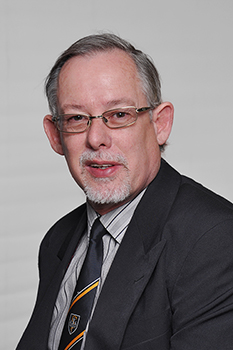Latest News Archive
Please select Category, Year, and then Month to display items
05 June 2018
Photo Supplied
 Archaeological excavations in the Wonderwerk Cave, north of Kuruman in the Northern Cape.
Archaeological excavations in the Wonderwerk Cave, north of Kuruman in the Northern Cape.
Research fellow Dr Lloyd Rossouw from the Department of Plant Sciences at the University of the Free State (UFS) recently published an article in the Nature Ecology and Evolution journal with Dr Michaela Ecker from the University of Toronto as lead author, and Dr James Brink, research fellow at the UFS Centre for Environmental Management. The findings described in “The palaeoecological context of the Oldowan-Acheulean in southern Africa” provides the first extensive paleoenvironmental sequence for the interior of southern Africa by applying a combination of methods for environmental reconstruction at Wonderwerk Cave, which have yielded multiple evidence of early human occupation dating back almost two million years ago.
Where water once was
The Wonderwerk Cave is found north of the Kuruman hills (situated in Northern Cape) a 140m long tube with a low ceiling. The surroundings are harsh. Semi-arid conditions allow for the survival of only hardy bushes, trees, and grasses. But during the Early Pleistocene, stepping out of the Wonderwerk Cave you would have been greeted by a completely different site, the researchers found. Using carbon and oxygen stable isotope analysis on the teeth of herbivores (Dr Ecker), fossil faunal abundance (Dr Brink), as well as the analysis of microscopic plant silica remains (phytoliths) excavated from fossil soils inside the cave (Dr Rossouw), the results show that ancient environments in the central interior of southern Africa were significantly wetter and housed a plant community unlike any other in the modern African savanna.
What difference does it make?
While East African research shows increasing aridity and the spread of summer-rainfall grasslands more than a million years ago, the results from this study indicate an interesting twist. During the same period, shifts in rainfall seasonality allowed for alternating summer and winter-rainfall grass occurrences coupled with prolonged wetlands, that remained major components of Early Pleistocene (more or less the period between one and two million years ago) environments in the central interior of southern Africa. That means our human ancestors were also living and evolving in environments other than the generally accepted open, arid grassland model.
Dean of Health Sciences receives prestigious international fellowship
2015-11-11

Dean of the Faculty of Health Science,
Prof Gert van Zyl
|
The Dean of our Faculty of Health Science, Prof Gert van Zyl, was admitted as an Inaugural Fellow of the Association for Medical Education in Europe (AMEE) at the annual conference in Glasgow.
This fellowship recognises members of AMEE who have demonstrated a consistent commitment to excellence in health professional education through scholarly contributions to the field over at least five years. Prof Van Zyl was honored with a Fellowship for his senior role related to education at the UFS, including his scholarly contributions. “This was an enormous privilege for me to be awarded the AMEE full Fellowship as one of only two South Africans to receive this honour from a prestigious organisation such as the AMEE. It also gives credit to the excellent work done by the team in the South African Association of Health Educationalists (SAAHE), and the Health Science Education team in the Faculty of Health Sciences at the UFS. All the leadership, hard work, and excellence over many years are acknowledged with this Fellowship. My appreciation to colleagues that motivated and inspired me during my academic journey to achieve this fellowship,” says Prof Van Zyl.
In seeking Fellowship of AMEE, applicants make a commitment to continue their leadership and the promotion of scholarship in health professional education into the future, as well as to the ongoing mentorship and development of more junior members who aspire to recognition at Associate Fellow or Fellow level. Fellows are expected to contribute actively to AMEE activities.
Prof Van Zyl was also recently appointed by the Minister of Health, Dr Aaron Motsoaledi, as Council Member representing Higher Education on the Health Professions Council of South Africa (HPCSA).